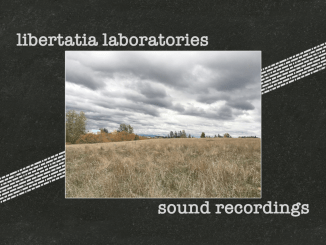
Libertatia Laboratories — Audio Experiments
In both musical and visual art, my approach is essentially a matter of collage. This is, perhaps, not so far from the method of synthesis that guides my historical and theoretical work or from the […]

In both musical and visual art, my approach is essentially a matter of collage. This is, perhaps, not so far from the method of synthesis that guides my historical and theoretical work or from the […]

Guinea-Pig Fleet was really the culmination of the first set of Libertatia Laboratories projects — some twenty years ago — a noisy sort of “ambient” project, driven by research I was doing at the time on nuclear and incendiary warfare, nuclear tests and civil defense. […]

I’m sharing the tracks here with a bit of a nod and wink. They are, among other things, uncharacteristically musical, even if that musicality is a bit mutated. […]

We become anarchists by embracing and internalizing anarchy. We express that internalized anarchy by constructing anarchisms. I take this to be a kind of general formula, describing the relations between three key concepts — anarchy, anarchist and anarchism — in their most general senses. This formula should be applicable to any form of anarchism that defines itself in terms of a commitment to anarchy. It should serve us as a rough schematic as we analyze and construct various anarchisms. […]

If we are to follow Proudhon’s an-archic account of social organization, we can expect the social collectivities that we encounter to be self-organizing associations of human beings, onto which some kind of governmental framework has been imposed from the outside. The authoritarian pretense is that society — human association in all its dynamic forms — has not really been established until the material relations of association have been seconded in some way by the establishment of an authority, sitting atop some kind of fundamentally political hierarchy. The anarchic response is that authority and hierarchy are inessential elements that we must learn to do without. […]

In the anarchist context, it is common to approach the question of legal order by asking whether anarchists truly desire a society in which nothing is prohibited. This is, it seems to me, only half of the question that needs to be asked, as an anarchic society would also be one in which nothing is permitted. And it is probably this second aspect that is most helpful in evaluating the antinomian character of anarchy. […]

[ Libertatia Laboratories — Audio Experiments — Main Page ]

The song remains the same — more or less. All of the various tracks that will make up relays & reconstructions are instances of a single composition assembled in Wotja, the generative music software I’ve been using on most of the hors du troupeau tracks. But because the software introduces gradual and partially random development into the composition as it unfolds, the sameness is relative — particularly as that development is allowed to continue. So, in order to explore the extent and character of that development it has made sense to allow the development to continue hour after hour, but also to record multiple instances of a “single” composition at similar lengths, both as audio files and as midi files. […]

I wanted—as a first step toward getting a more comprehensive selection of Armand’s writings into print—to draw together a selection of short, direct articles and poems that presented the tone of his egoist anarchist individualism, along with some of the key preoccupations and recurring tropes from his writings. […]

To restrain the passions! To narrow the horizon of the enjoyment of living? Christianity has attempted it and failed. Socialism will try to reduce humanity to a similar denominator of necessities and it will fail. Fourier saw clearly when he coined this masterful expression: “the use of passions.” […]
Copyright © 2025 | MH Magazine WordPress Theme by MH Themes